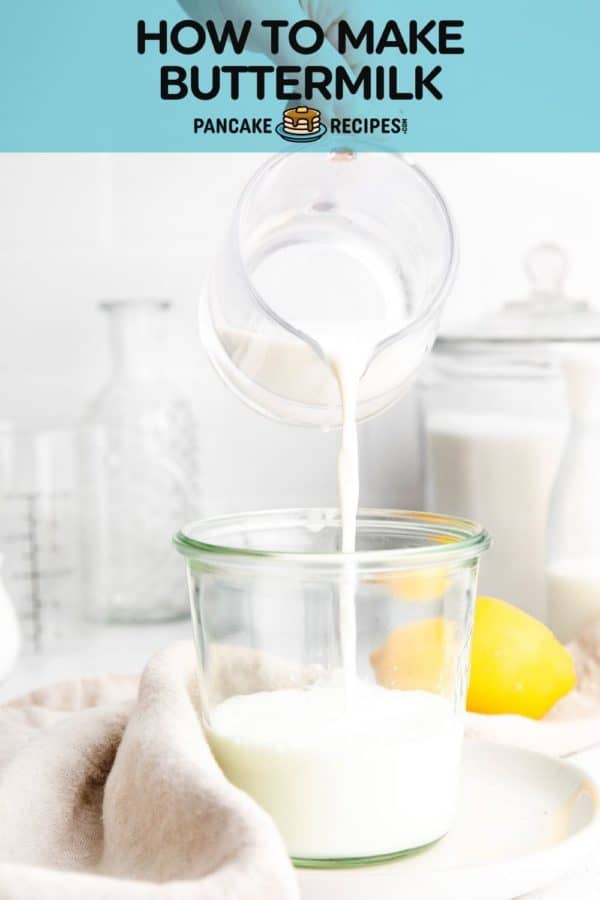How To Make Buttermilk Substitute From Milk
Learn how to make buttermilk in a pinch with this super simple guide. You’re just 2 ingredients away from never having to run back to the store again!
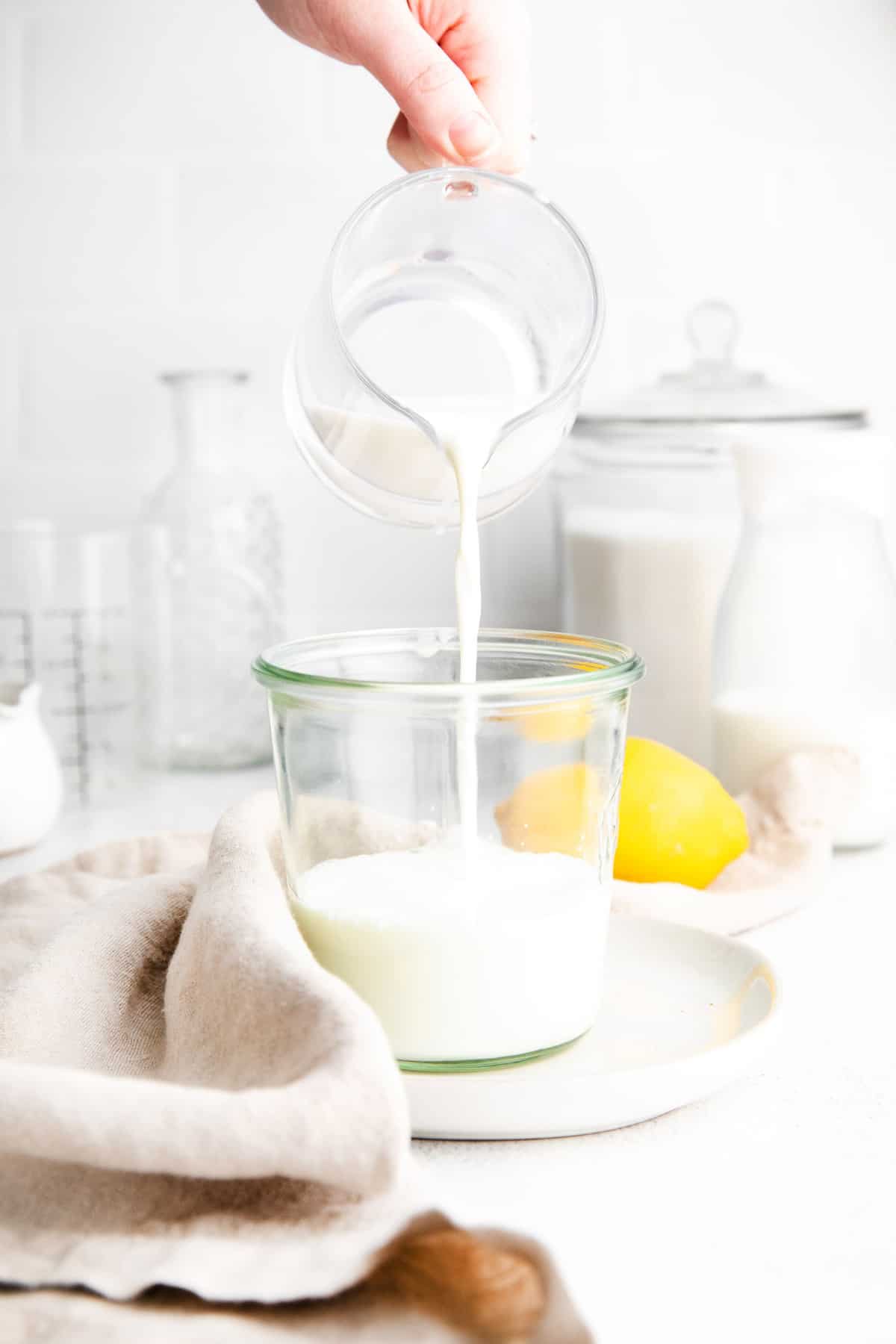
Knowing how to quickly pull together homemade buttermilk is a trick you’ll want to keep handy. Being able to make a stack of fluffy buttermilk pancakes for your hangry kids on a Saturday morning is kind of a parenting survival skill. But more than that, realizing you’ve run out of buttermilk is well…the opposite of that!
What’s buttermilk?
Buttermilk is the liquid that is produced after churning homemade butter. What results is a lowfat, culture-rich liquid that, when used in baking, produces a tangy, moist, soft crumb. It’s used for cake and pancake recipes as well as biscuits, muffins, and more.
It isn’t something you typically buy without a purpose. Even when you do, you don’t normally use all of it, so it often ends up going bad. Then there are those pesky days when you start making blueberry buttermilk pancakes or strawberry buttermilk pancakes, and you realize you’re out of buttermilk. That’s the worst! Especially because you know what a difference it makes in their flavor and texture, so you can’t even contemplate using regular milk!
Lucky for you, making a DIY buttermilk substitute is as simple as combining milk and your choice of 3 different acids. This easy-to-follow guide will get you homemade “buttermilk” no matter which option you choose. Save yourself an extra trip to the store and reduce waste by only making the amount you need!
The results are as good as the real thing, and in recipes that require just a small amount of buttermilk, no one will know the difference!
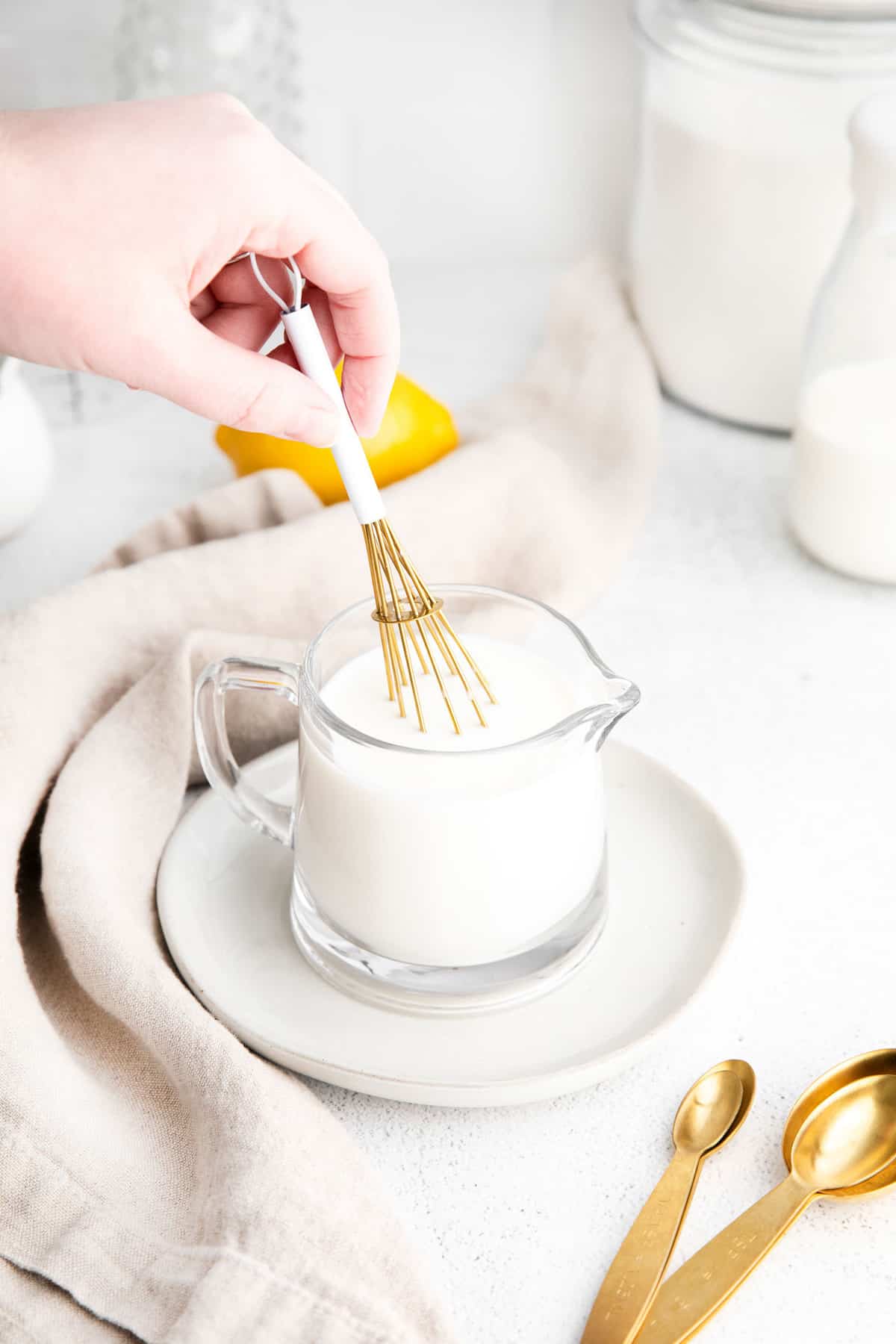
What you need
For this easy recipe you will need milk and ONE type of acid. Choose one of the three listed:
- Vinegar – Use neutral-tasting vinegar. White distilled vinegar is best, but apple cider or white wine vinegar will also work. Stay away from balsamic or any flavored vinegar.
- Lemon juice – For one cup of buttermilk, one lemon should be more than enough.
- Cream of tartar – A powder easily found at your local bulk food, health food, or grocery store.

3 Ways to make buttermilk
Milk & Vinegar
In a large glass measuring cup, add the appropriate amount of vinegar. Pour in the milk until it reaches the 1 cup line. Allow it to sit for up to 10 minute. Curdling is totally normal! Once it has set, it’s ready to use as desired.
Milk & Lemon juice
Take a lemon, cut it in half and squeeze out the amount you need into a measuring cup. Fill the cup with milk and let it sit for up to 10 minutes. Use as desired.
Milk & Cream of Tartar
This powder is a little more concentrated so you’ll need a bit less. The same instructions apply. Add cream of tartar to a measuring cup and fill the remaining space of 1 cup with milk. Allow it to sit and once slightly curdled, it’s ready for use.

FAQs
Technically yes. It’s not directly interchangeable since cream is non-acidic and doesn’t react with the baking soda or baking powder in a recipe but if you add lemon juice or vinegar to the cream, it can be used as a suitable replacement.
The awesome thing about making your own buttermilk is it can be used with virtually ANY milk! Almond milk, oat milk, soy milk, cashew milk and even coconut milk will work!
The acid in buttermilk reacts with the baking soda or baking powder (or both) in a recipe giving all your baked goods a lovely rise. It’s also rich, thick, and tangy, giving it an amazing flavor and moisture.
They are! Actually, so is yogurt. You can use ¾ cup sour cream or yogurt along with ¼ cup of milk to thin it out. If you have kefir on hand, you could also use that. It’s fermented milk, so there’s nothing more you need to add to it.
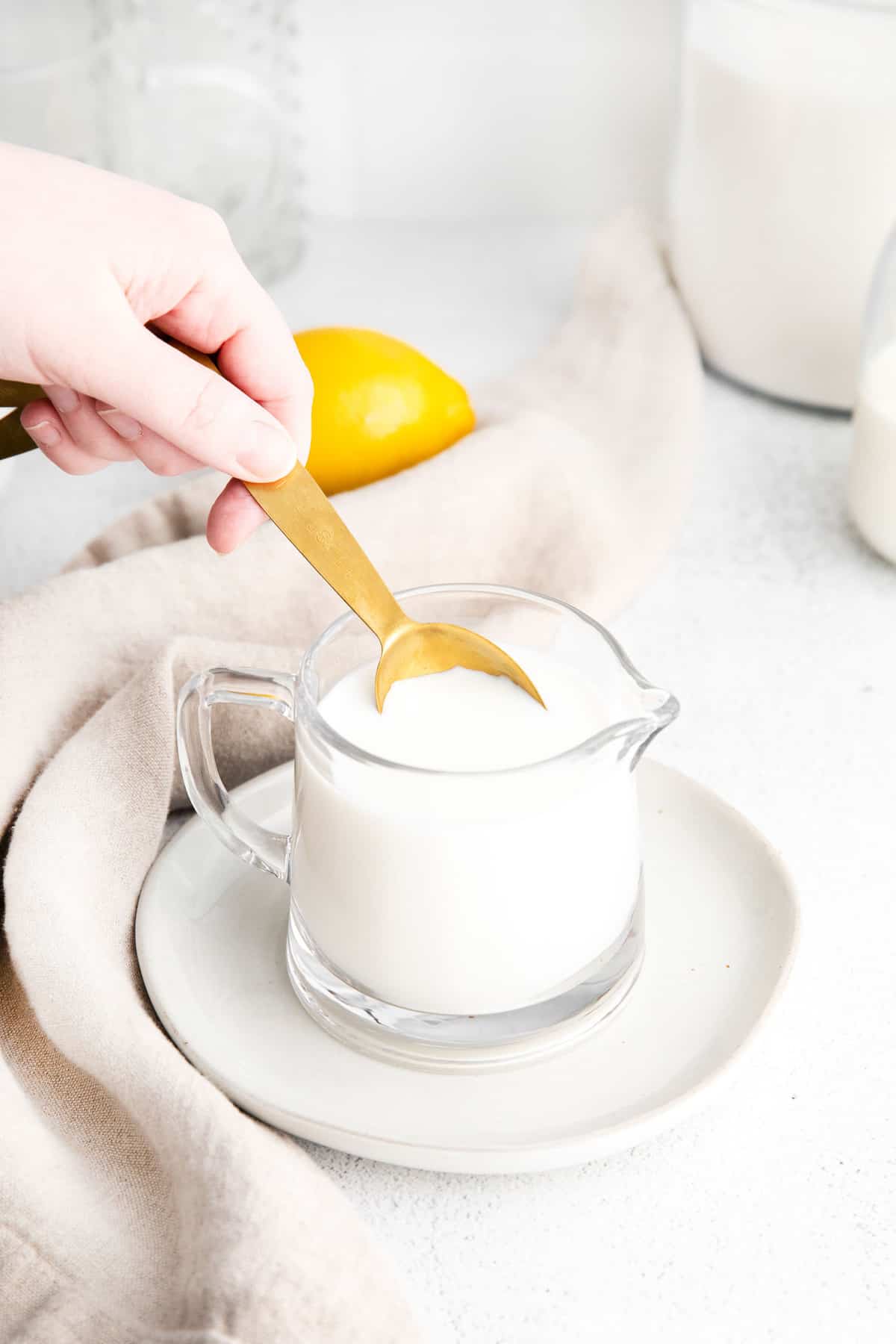
How to make any amount of buttermilk with vinegar or lemon juice!
- ¼ cup buttermilk = ¼ cup milk and ¾ teaspoon of lemon juice OR vinegar
- ⅓ cup buttermilk = ⅓ cup milk and 1 teaspoon lemon juice OR vinegar
- ½ cup buttermilk= ½ cup milk and 1 ½ teaspoons lemon juice OR vinegar
- 1 cup buttermilk = 1 cup milk and 1 tablespoon lemon juice OR vinegar
TIP! Anything over those three amounts, just add the amounts as needed! For example, if you need 1 ½ cups, add the 1 cup and ½ cup measurements together.
Storage Suggestions
Unlike the store-bought version, this homemade buttermilk won’t last long in the fridge. It will keep in an airtight container in the fridge for up to 2 weeks but really it’s best used immediately after you make it. It also freezes really well for up to 2 months. If you proportion it in small amounts (for example in an ice cube tray) you only have to thaw what you need each time.
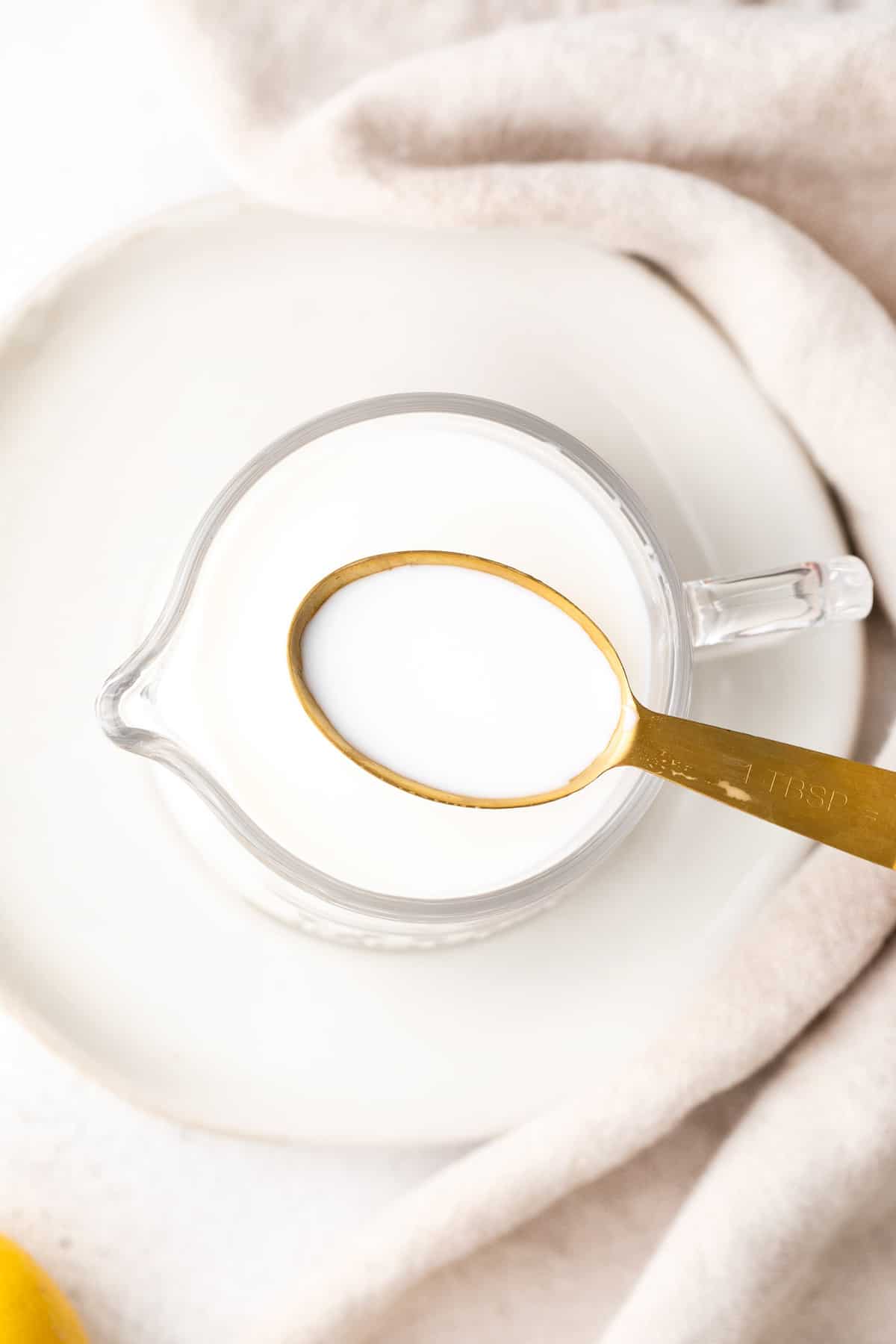
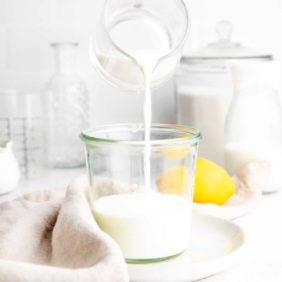
Get the Recipe: How to Make Buttermilk
Ingredients
- 1 tablespoon vinegar OR 1 tablespoon lemon juice OR 1 ¾ teaspoon cream of tartar (don’t use all three!)
- 1 cup milk
Instructions
- In a measuring cup, add vinegar (or lemon juice, or cream of tartar).
- Add milk to 1 cup line and stir well to combine.
- Set it aside for 5-10 minutes before using. It will look curdled, so don’t be alarmed by that! Use in recipes that call for buttermilk.
Notes
- Use a neutral tasting vinegar. White distilled vinegar is best but apple cider or white wine vinegar will also work. Stay away from balsamic or any flavored vinegars.
- Makes 1 cup but you can scale to other measurements as needed.

